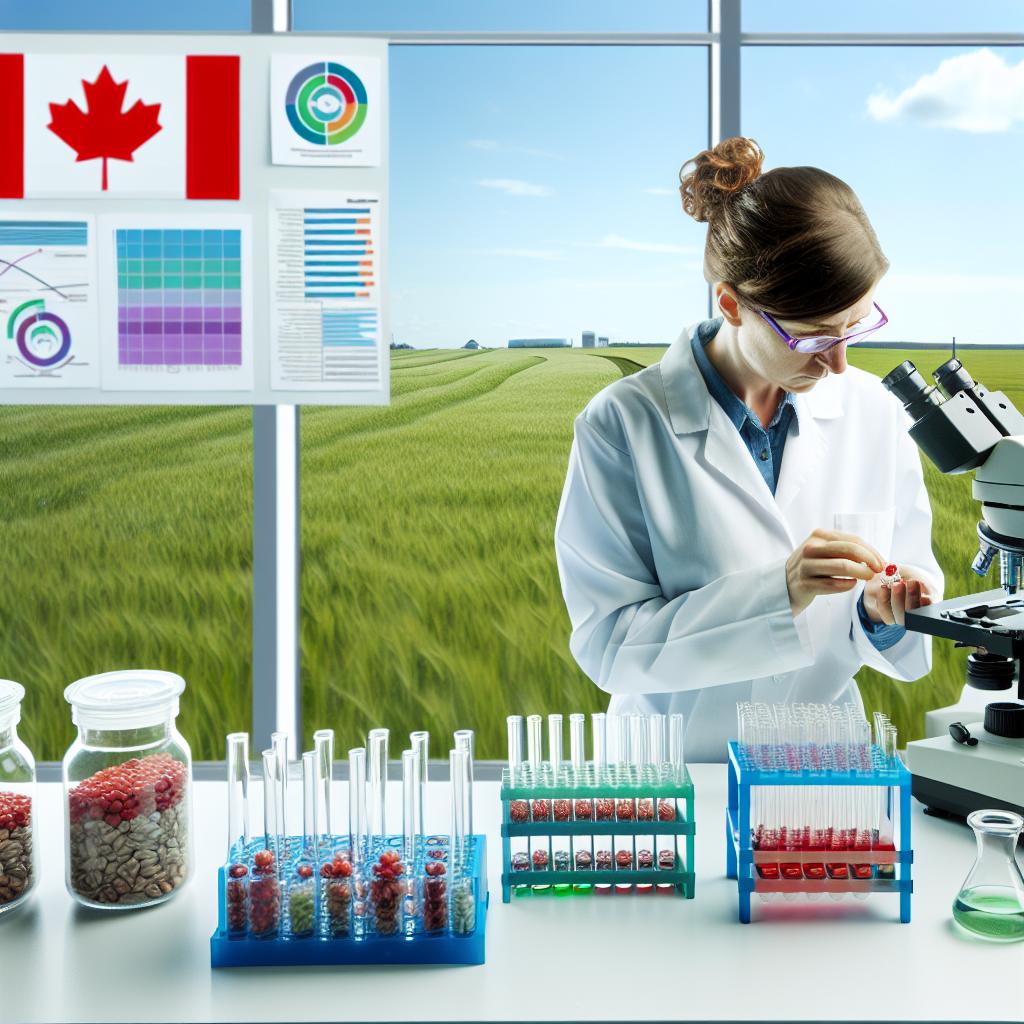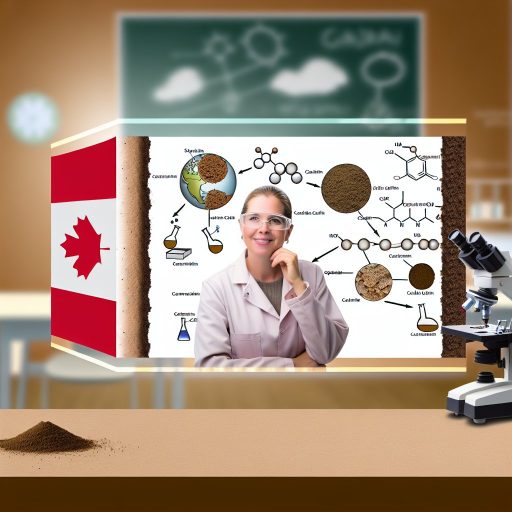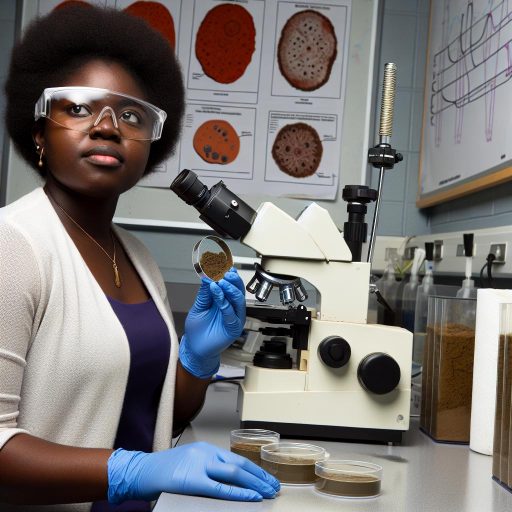Introduction to Food Security and the Role of Seed Technologists in Canada
Food security is crucial for maintaining a healthy population.
It refers to the availability of food, access to food, and proper nutrition.
In Canada, food security faces various challenges that impact citizens.
Seed technologists play a vital role in overcoming these challenges.
They focus on developing and improving crop varieties.
By ensuring the availability of high-quality seeds, they contribute to food security.
Additionally, their work supports sustainable farming practices.
Seed technologists collaborate with farmers to understand their needs.
This collaboration helps to select the most suitable seed varieties.
Moreover, they conduct research on pest resistance and climate adaptability.
These efforts directly influence crop yield and quality.
A well-managed seed supply chain is essential for food production.
Seed technologists also educate farmers about best practices.
This education improves planting techniques and crop management.
Ultimately, their expertise fosters resilience in Canadian agriculture.
As the population grows, food production demands increase.
Seed technologists adapt to these changes by innovating continuously.
Therefore, they are critical in ensuring a stable food supply.
By developing varieties that meet market demands, they enhance food security.
This dynamic field is essential for addressing future agricultural challenges.
The contributions of seed technologists are fundamental.
They support food security in Canada, ensuring nutrition for all citizens.
Overview of Canada’s Agricultural Landscape
Canada boasts a rich and diverse agricultural landscape.
This landscape plays a critical role in the country’s food security.
The country contains vast farmlands, forests, and water bodies.
Unlock Your Career Potential
Visualize a clear path to success with our tailored Career Consulting service. Personalized insights in just 1-3 days.
Get StartedCanada’s agriculture includes grains, livestock, and dairy production.
From wheat fields in the Prairies to vineyards in Ontario, diversity flourishes.
Significance of Agricultural Production
Agricultural production is vital for feeding Canada’s population.
Moreover, it supports the economy through exports and job creation.
In fact, agriculture contributes significantly to Canada’s GDP.
Canada exports over half its agricultural output, reaching global markets.
This enhances trade relationships and food availability worldwide.
Challenges in Food Security
Despite its strengths, Canada’s agricultural sector faces challenges.
Climate change is impacting crop yields and farming practices.
Pests and diseases also threaten food production.
Additionally, urban sprawl reduces available farmland.
Efforts are necessary to combat these pressing issues.
The Role of Seed Technologists
Seed technologists are crucial for enhancing agricultural productivity.
They develop high-quality seeds that withstand environmental challenges.
Through research and innovation, they improve crop resilience.
This contributes directly to food security by increasing yields.
In Canada, their work ensures that farmers have access to robust seed varieties.
Role of Seed Technology in Enhancing Crop Yields and Resilience
Introduction to Seed Technology
Seed technology is vital for modern agriculture in Canada.
It encompasses breeding, genetics, and biotechnology.
This technology aims to improve crop performance and sustainability.
Impact on Crop Yields
Higher crop yields directly enhance food production.
Seed technologists select traits that promote growth.
For instance, drought-resistant seeds thrive in low-water conditions.
Furthermore, high-yield varieties allow farmers to maximize their land use.
This innovation supports Canada’s goal of food security.
Building Resilience Against Climate Change
Climate change poses significant risks to agriculture.
Seed technology helps develop resilient crops.
These crops withstand extreme weather events like floods and droughts.
Additionally, they can resist pests and diseases more effectively.
This resilience is crucial for ensuring consistent food supply.
Benefits of Advanced Breeding Techniques
Advanced breeding techniques enhance the quality of seeds.
Biotechnology and genomics guide these advancements.
As a result, new seed varieties offer improved nutrition.
Farmers benefit from higher market value through quality improvement.
Overall, these techniques increase farmers’ profitability.
Collaboration with Agricultural Stakeholders
Seed technologists work closely with farmers and researchers.
This collaboration ensures that seeds meet local needs.
Workshops and training programs educate farmers on new technologies.
Such efforts promote a widespread understanding of best practices.
This knowledge transfer is essential for effective implementation.
The Future of Seed Technology in Canada
Ongoing research and development are crucial for improvement.
Investment in seed technology will drive future advancements.
Canadian farms will increasingly rely on innovative solutions.
This will help ensure food security amidst growing challenges.
Therefore, supporting seed technology is vital for sustainable agriculture.
Gain More Insights: Innovations in Seed Technology for Sustainable Farming
Development of Disease-Resistant Seeds to Combat Agricultural Threats
Importance of Disease Resistance
Disease resistance in crops is essential for ensuring food security.
Crops vulnerable to diseases can lead to significant yield losses.
Technologists work diligently to develop seeds that can withstand various pathogens.
By prioritizing disease resistance, they help stabilize food production.
Research and Development Processes
The development of disease-resistant seeds begins with thorough research.
Scientists analyze disease patterns and identify specific threats to crops.
They then explore genetic traits that can enhance resistance in plants.
For instance, researchers at AgriTech Innovations focus on using CRISPR technology.
This method allows precise edits to the DNA of plants to bolster their defenses.
Collaboration with Farmers
Seed technologists often collaborate closely with farmers.
Farmers provide valuable insights into pest and disease challenges.
This partnership helps ensure the developed seeds perform well in real-world conditions.
Feedback from farmers also identifies further improvements needed in seed traits.
Field Trials and Validation
Before commercial release, disease-resistant seeds undergo extensive field trials.
These trials assess how well the seeds perform under various conditions.
Researchers monitor for disease incidence during these trials.
Successful trials lead to the eventual approval of the seeds for market use.
Impact on Food Security
The development of disease-resistant seeds significantly enhances food security in Canada.
These seeds allow farmers to produce stable and consistent yields.
As a result, communities experience reduced food shortages and increased availability.
Improved crop resilience also supports economic stability within the agricultural sector.
Delve into the Subject: Challenges in Implementing Sustainable Farming Solutions
The Impact of Climate Change on Seed Development and Food Security
Understanding the Challenge
Climate change poses significant challenges to agriculture in Canada.
Rising temperatures and altered precipitation patterns affect crop yields.
Moreover, extreme weather events disrupt planting and harvesting schedules.
As a result, food security becomes increasingly uncertain for Canadians.
Seed Development Innovations
Seed technologists play a crucial role in addressing these challenges.
They develop drought-resistant seed varieties to withstand fluctuating water supplies.
Additionally, they focus on breeding crops that can tolerate extreme temperatures.
These innovations are essential for maintaining crop yields under climate stress.
Collaboration with Researchers
Seed technologists collaborate closely with agricultural researchers.
This partnership enhances the understanding of plant responses to climate change.
They employ advanced genetic techniques to improve seed resilience.
Furthermore, they share knowledge to assist farmers in adapting to changing conditions.
Impact on Food Security
Successful seed development directly influences food security in Canada.
Improved seeds lead to higher productivity, ensuring a stable food supply.
This stability is vital for both local consumption and export markets.
Furthermore, resilient crops improve farmer livelihoods across the country.
Community Engagement and Education
Seed technologists engage with farming communities to promote sustainable practices.
They conduct workshops to educate farmers on new seed technologies.
Furthermore, by sharing best practices, they enhance agricultural resilience.
This community-based approach strengthens food security at the local level.
See Related Content: Key Skills Needed to Excel as a Seed Technologist
Technological Advancements in Seed Breeding and Their Implications for Farmers
Introduction to Modern Seed Technology
Modern seed technology revolutionizes agriculture in Canada.
It employs advanced methods to create stronger, more resilient crops.
This progress directly addresses food security challenges.
Genetic Engineering and Crop Improvement
Genetic engineering allows scientists to enhance crop traits significantly.
This technology improves resistance to pests and diseases.
Additionally, crops can be designed to thrive in extreme weather.
Farmers benefit from higher yields and reduced loss rates.
Hybrid Seed Development
Hybrid seeds combine the best traits from parent plants.
This method ensures greater productivity and adaptability.
Farmers using hybrids witness improved performance in diverse conditions.
Enhanced Seeds for Sustainable Farming
Enhanced seeds promote sustainable farming practices.
They reduce the need for chemical inputs like fertilizers and pesticides.
This aspect supports both environmental health and farmer profitability.
The Role of Seed Technologists
Seed technologists play a crucial role in this evolution.
Their expertise ensures that breeding programs meet farmer needs.
They also focus on developing seeds that are climate-resilient.
Regulatory Framework and Compliance
The regulatory framework governs the use of advanced seed technology.
Compliance with safety standards is mandatory for new seed varieties.
This process safeguards farmers and consumers alike from risks.
Future Innovations in Seed Technology
Future innovations promise even more advancements in agriculture.
Research into gene editing techniques is rapidly evolving.
This could lead to breakthroughs that further enhance food security.
Implications of Advancements in Seed Technology
Technological advancements in seed breeding significantly impact farmers.
They provide tools for greater productivity and sustainability.
As a result, these innovations contribute to the food security landscape in Canada.
Learn More: The Science Behind Tree Pruning and Arborist Expertise

Collaboration between Seed Technologists and Farmers for Sustainable Practices
The Role of Seed Technologists
Seed technologists play a critical role in food security.
They develop high-quality seeds that withstand various environmental conditions.
These professionals focus on breeding methods that enhance crop resilience.
Additionally, they conduct research to optimize seed performance.
Establishing Effective Communication
Effective communication fosters collaboration between seed technologists and farmers.
Regular workshops and meetings facilitate knowledge sharing.
Farmers provide feedback on seed performance in real-world conditions.
This partnership ensures that seed development aligns with practical agricultural needs.
Implementing Sustainable Practices
Collaboration leads to the adoption of sustainable practices on farms.
Seed technologists offer insights on crop rotation and cover cropping methods.
These practices improve soil health and increase biodiversity.
Consequently, farmers can achieve better yields over time.
Innovative Approaches to Pest Management
Innovative pest management strategies arise from collaboration.
Seed technologists work with farmers to develop pest-resistant crops.
This reduces the need for chemical pesticides in agriculture.
Furthermore, it promotes ecological balance within farming systems.
The Benefits of Sustainable Seed Systems
Sustainable seed systems enhance food security in Canada.
They ensure a consistent supply of healthy crops for the population.
By focusing on sustainability, these systems strengthen local economies.
In addition, they support community resilience against climate change.
Regulatory Frameworks Governing Seed Technology and Food Security in Canada
Overview of Seed Regulation
Seed regulation is vital for food security in Canada.
This regulation ensures safe and reliable access to seeds.
The Canadian Food Inspection Agency (CFIA) plays a key role.
CFIA oversees seed quality, labeling, and variety registration.
Additionally, the Seeds Act sets the legal framework for seed regulation.
The Role of Seed Technologists
Seed technologists are integral to food security efforts.
They ensure seeds meet quality and safety standards.
Furthermore, they contribute to research and development of new varieties.
Their work promotes resilience against climate change and pests.
By innovating, they help sustain crop yields over time.
Legislation Supporting Food Security
Several key legislations impact seed technology in Canada.
The Seeds Act regulates seed production and distribution.
The Plant Breeders’ Rights Act protects new plant varieties.
Moreover, the Food and Drugs Act governs food safety practices.
These laws facilitate safe agricultural practices nationwide.
Collaboration with Stakeholders
Effective seed regulation requires collaboration among various stakeholders.
Government agencies, farmers, and industry experts work closely together.
This partnership fosters a system that prioritizes food availability.
Additionally, non-profit organizations advocate for equitable access to seeds.
Such collaboration ultimately benefits consumers and the agricultural community.
Challenges and Future Directions
Canada faces challenges in seed regulation and food security.
Climate change presents significant threats to agriculture.
Technological advancements must keep pace with evolving needs.
Moreover, public awareness about seed technology is crucial.
Future efforts should emphasize sustainable practices and innovation.
Future Trends in Seed Technology and Their Potential Impact on Canadian Agriculture
Advancements in Genetic Engineering
Genetic engineering significantly enhances crop resilience.
It allows for the development of varieties that withstand climate change impacts.
Furthermore, these advancements help in reducing reliance on chemical pesticides.
Precision Agriculture Technologies
Precision agriculture is transforming how farmers manage their fields.
Tools such as drones and soil sensors provide real-time data.
This data helps optimize planting strategies and resource applications.
In turn, farmers can increase yields while minimizing waste.
Integrating AI and Machine Learning
Artificial intelligence and machine learning are becoming crucial in agriculture.
These technologies analyze vast datasets for better decision-making.
They predict pest outbreaks and disease risks with higher accuracy.
Consequently, farmers can take preventive measures more effectively.
Emerging Crop Varieties
Seed technologists are constantly developing new crop varieties.
These varieties often have improved nutritional profiles and growth rates.
They also offer better drought resistance, benefiting Canadian farmers.
In addition, these advancements contribute to food security across the nation.
Collaboration with Research Institutions
Partnerships between seed companies and research institutions are vital.
They foster innovation in seed technology practices and methodologies.
Such collaboration helps ensure the development of competitive seed options.
It also supports sustainable farming practices across Canada.
Policy and Regulatory Changes
Changes in policies affect seed technology development significantly.
Regulations surrounding genetically modified organisms are evolving.
This shift influences the types of seeds available to Canadian farmers.
Therefore, staying informed about regulatory landscapes is crucial for success.
Additional Resources
Agriculture and Agri-Food Canada’s Strategic Plan for Science …
United States Department of Agriculture FY 2025 BUDGET SUMMARY




